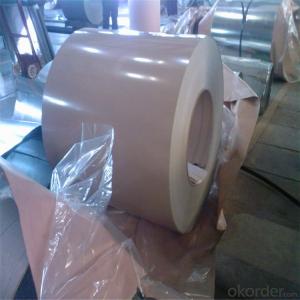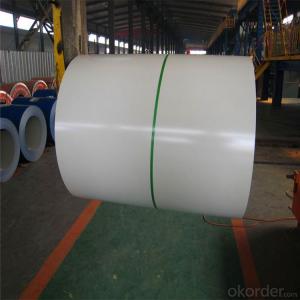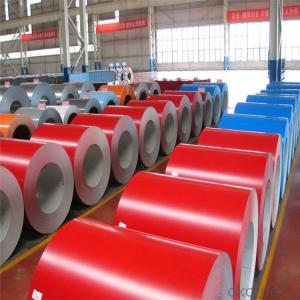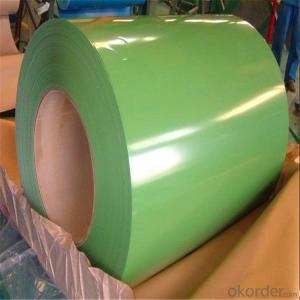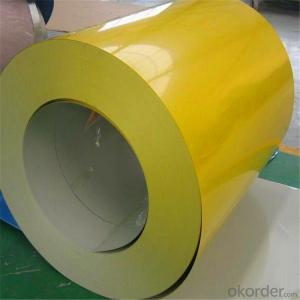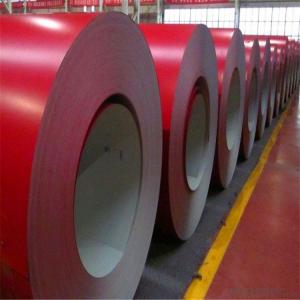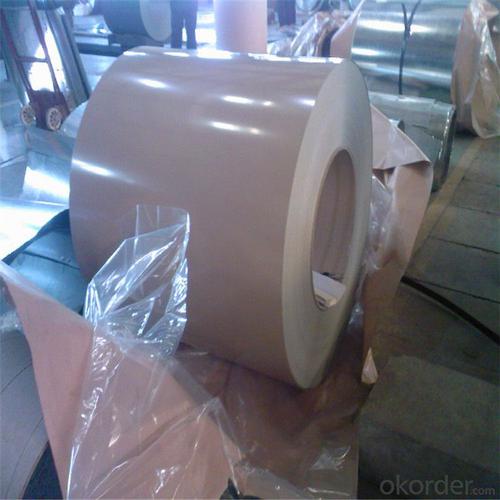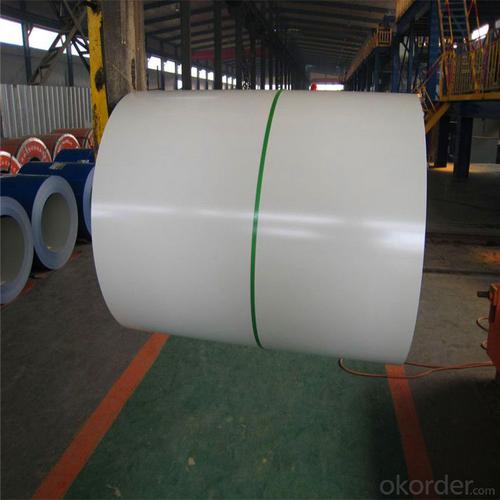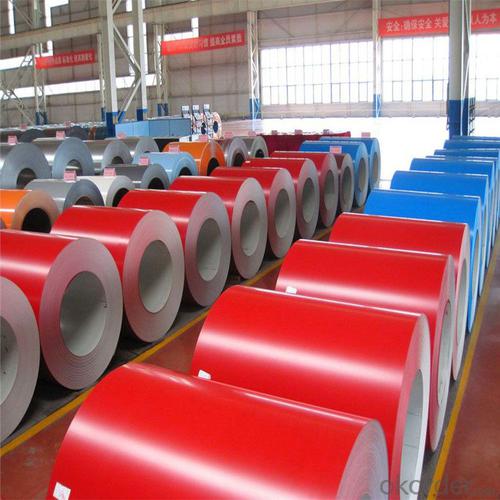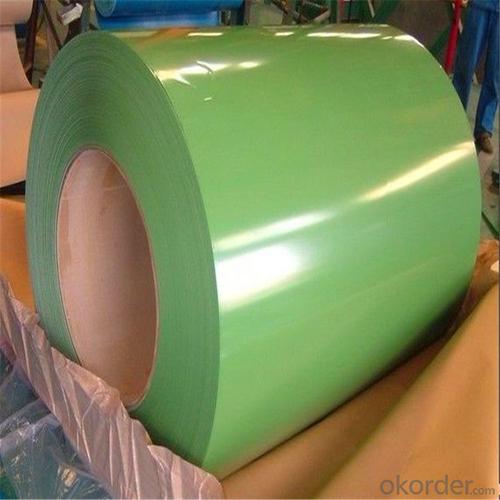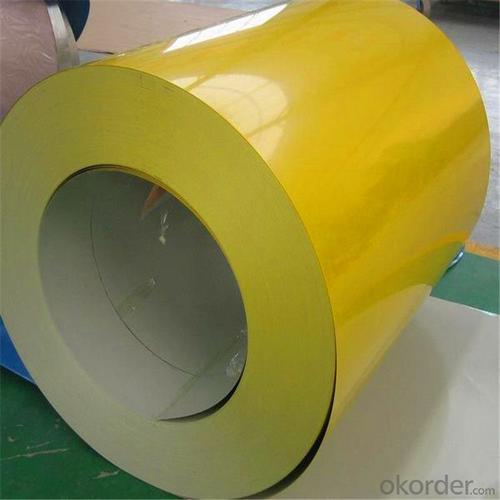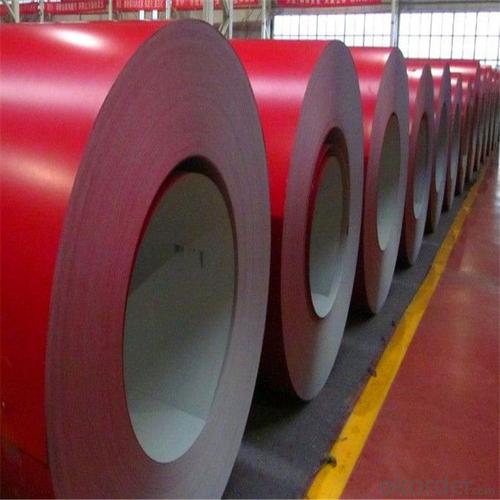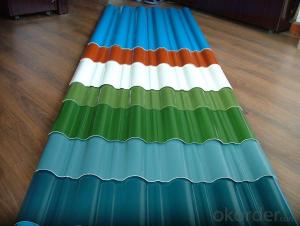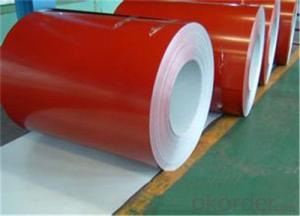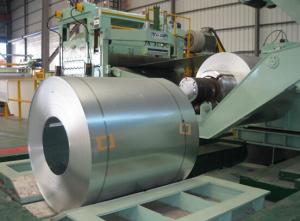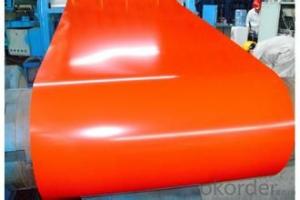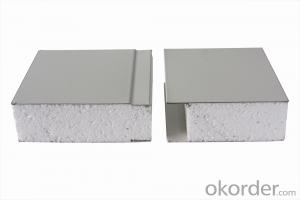Galvanized Steel Sheet in PPGI Coils from CNBM
- Loading Port:
- Tianjin
- Payment Terms:
- TT or LC
- Min Order Qty:
- 25 m.t.
- Supply Capability:
- 5000 m.t./month
OKorder Service Pledge
OKorder Financial Service
You Might Also Like
Specification
Galvanized Steel Sheet in PPGI Coils
Description of Galvanized Steel Sheet in PPGI Coils
Product | PPGI/PPGL |
Capacity | 5,000 tons/month |
Base material | Hot dipped galvanized steel |
Thickness | 0.2-2.0mm |
Width | 600-1250mm(according to your need) |
Coil Weight | 3-6tons |
Quality | SGCC, DX51D |
Color | RAL No. or customers samples’ color |
Zinc-coating | 30g/m2-180g/m2 |
Coil ID | 508mm/610mm |
Technique | Cold rolled—hot dipped galvanized—color coated |
Painting | Top painting:15~25μm |
Back painting: 6~10μm | |
Tolerance | Thickness: +/-0.02mm |
Width:+/-2mm | |
Shipment time | within 15-45 workdays |
Payment | T/T, L/C at sight |
Packing | Standard export packing |
The special order can be negotiated. | |
Application of Galvanized Steel Sheet in PPGI Coils
APPLICATION OF OUR PREPAINTED STEEL | ||||||||||
Construction | Outside | Workshop,agricultural warehouse,residential precast unit | ||||||||
corrugated roof,roller shutter door,rainwater drainage pipe,retailer booth | ||||||||||
Inside | Door,doorcase,light steel roof stucture,folding screen,elevator,stairway,ven gutter,Construction Wall | |||||||||
Electrical applicance | Refrigerator,washer,switch cabnet,instrument cabinet,air conditioning,micro-wave owen,bread maker | |||||||||
Fuiniture | Central heating slice,lampshade,chifforobe,desk,bed,locker,bookself | |||||||||
Carrying trade | Exterior decoration of auto and train,clapboard,container,isolation lairage,isolation board | |||||||||
Qthers | Writing panel,garbagecan,billboard,timekeeper,typewriter,instrument panel,weight sensor,photographic equipment | |||||||||
Products Show of Galvanized Steel Sheet in PPGI Coils

Product Advantages
1.With nearly 20 years experience in prepainted steel, accommodate different marketdemands. | ||||||||||||||
2.'Quality first, service first' is our business aim; 'The good faith get respect,cast quality market' is our Business philosophy . | ||||||||||||||
3.Having two series producttion line,with the abbual production capacity of 240000 tons. | ||||||||||||||
4.Exceed International ISO9001:2008&ISO14001:2004 quality and environmental standards | ||||||||||||||
5.Meet with ROHS standard |
Company Information
CNBM International Corporation is the most important trading platform of CNBM group.
Whith its advantages, CNBM International are mainly concentrate on Cement, Glass, Iron and Steel, Ceramics industries and devotes herself for supplying high qulity series of refractories as well as technical consultancies and logistics solutions.


F A Q
1, Your advantages?
professional products inquiry, products knowledge train (for agents), smooth goods delivery, excellent customer solution proposale
2, Test & Certificate?
SGS test is available, customer inspection before shipping is welcome, third party inspection is no problem
3, Factory or Trading Company?
CNBM is a trading company but we have so many protocol factories and CNBM works as a trading department of these factories. Also CNBM is the holding company of many factories.
4, Payment Terms?
30% TT as deposit and 70% before delivery.
Irrevocable L/C at sight.
5, Trading Terms?
EXW, FOB, CIF, FFR, CNF
6, After-sale Service?
CNBM provides the services and support you need for every step of our cooperation. We're the business partner you can trust.
For any problem, please kindly contact us at any your convenient time.
We'll reply you in our first priority within 24 hours.
- Q: How does special steel contribute to the energy generation industry?
- Special steel plays a crucial role in the energy generation industry by contributing to the efficiency, reliability, and safety of various components and equipment used in power plants. One key area where special steel is essential is in the construction of turbine blades and generator rotors. These components are subjected to extreme temperatures, pressures, and mechanical stresses. Special steels, such as superalloys, are specifically designed to withstand these harsh conditions, ensuring the longevity and performance of these critical parts. By using special steel, power plants can operate at higher temperatures and pressures, leading to increased energy efficiency and power output. In addition to turbine components, special steel is also used in the construction of boilers and heat exchangers. These components are exposed to high temperatures and corrosive environments. Special steel alloys, such as stainless steels, are highly resistant to corrosion and can withstand the harsh conditions encountered in power plant operations. This corrosion resistance ensures the longevity and reliability of these components, reducing maintenance costs and downtime. Furthermore, special steel is utilized in the construction of transmission and distribution infrastructure. Steel cables and conductors are used to transmit electricity over long distances, and special steel alloys provide the necessary strength and conductivity for efficient power transmission. Additionally, steel is used in the construction of towers, poles, and other support structures, ensuring the stability and reliability of the electrical grid. Moreover, special steel is also vital in the production of nuclear energy. Nuclear power plants require materials that can withstand extreme temperatures, high radiation levels, and corrosive environments. Special steel alloys, such as stainless steels and nickel-based alloys, are specifically designed to meet these requirements, providing the necessary strength, resistance to radiation, and corrosion resistance for the safe and efficient operation of nuclear reactors. In summary, special steel is an integral part of the energy generation industry. Its unique properties and capabilities contribute to the efficiency, reliability, and safety of various components and equipment used in power plants. By using special steel, power plants can increase energy efficiency, reduce maintenance costs, and ensure the longevity and performance of critical infrastructure, ultimately supporting the sustainable and reliable generation of electricity.
- Q: What are the different forging grades of special steel?
- There are several different forging grades of special steel, including but not limited to stainless steel, alloy steel, carbon steel, tool steel, and high-speed steel.
- Q: What are the main applications of special steel in the chemical processing industry?
- Special steel is widely used in the chemical processing industry due to its exceptional properties such as corrosion resistance, high strength, and heat resistance. It finds applications in various components and equipment such as reactors, heat exchangers, pipes, valves, and fittings. These materials are crucial for handling corrosive chemicals, withstanding high temperatures and pressures, and ensuring the integrity and safety of chemical processing operations.
- Q: What are the challenges in heat treatment of special steel alloys?
- The heat treatment of special steel alloys presents various difficulties due to their unique composition and properties. One of the primary obstacles is attaining the desired microstructure and mechanical properties while maintaining dimensional stability. Special steel alloys often contain intricate alloying elements and necessitate specific heat treatment processes to achieve the desired properties. Another hurdle involves controlling the rates of heating and cooling throughout the heat treatment procedure. Special steel alloys are often sensitive to rapid or uneven temperature changes, which can lead to distortion, cracking, or the formation of undesirable phases. Hence, ensuring precise control of the heating and cooling rates is crucial to avoid these issues and ensure uniformity in the final product. Furthermore, the presence of alloying elements in special steel alloys can increase their hardenability, making it challenging to achieve the desired hardness consistently across the entire component. Adequate attention must be given to selecting appropriate heat treatment parameters, including temperatures, soaking times, and quenching media, in order to achieve the desired hardness and prevent excessive hardness gradients. Additionally, special steel alloys are prone to oxidation and decarburization during heat treatment due to their high alloy content and exposure to elevated temperatures. These reactions can result in surface defects and a decrease in carbon content, thereby impacting the final properties of the alloy. Consequently, careful control of protective atmospheres or heat treatment environments is necessary to prevent such issues. Moreover, the size and shape of components made from special steel alloys can pose challenges during heat treatment. Large or intricately shaped components require careful consideration of heating and cooling methods to ensure uniformity in microstructure and properties throughout the entire component. This may involve the use of specialized furnaces, fixtures, or heat treatment cycles to overcome these challenges. In conclusion, the challenges involved in heat treating special steel alloys encompass achieving the desired microstructure and mechanical properties, controlling heating and cooling rates, managing hardenability, preventing oxidation and decarburization, and addressing the size and shape of components. Overcoming these challenges demands a comprehensive understanding of the alloy's composition, properties, and the application of appropriate heat treatment techniques.
- Q: How does special steel perform in marine environments?
- Special steel performs exceptionally well in marine environments due to its high corrosion resistance. It is specifically designed to withstand the harsh conditions of saltwater, preventing corrosion and ensuring long-term durability. Additionally, special steel has excellent strength and toughness properties, making it suitable for various marine applications, such as shipbuilding, offshore structures, and underwater equipment.
- Q: How is special steel used in the railway supply chain?
- Special steel is used in the railway supply chain for various critical components such as rails, wheels, and axles, due to its superior strength, durability, and resistance to wear and fatigue. This high-quality steel ensures safe and reliable train operations, reducing maintenance needs and increasing the lifespan of railway infrastructure.
- Q: What are the applications of tool steel?
- Tool steel has a wide range of applications due to its high hardness, resistance to wear, and ability to retain sharp edges. It is commonly used in the manufacturing of cutting tools, dies, molds, and machine components that require high strength and durability. Additionally, tool steel finds its use in the automotive, aerospace, and construction industries, where its properties are crucial for efficient and precise operations.
- Q: What are the quality control measures for special steel?
- The quality control measures for special steel typically involve several steps. First, there is a thorough inspection of the raw materials used to manufacture the steel, ensuring they meet the required specifications and standards. Next, the production process is closely monitored to ensure proper alloying and precise temperature control. Regular testing and sampling are conducted throughout the manufacturing process to check for any defects or deviations from the desired composition and properties. Specialized testing methods, such as ultrasonic or magnetic particle inspection, are utilized to identify any internal or surface defects. Finally, the finished product undergoes a final inspection to ensure it meets all the required specifications, including dimensions, mechanical properties, and surface finish. These rigorous quality control measures help to ensure that special steel meets the highest standards of quality and performance.
- Q: How is special steel used in the marine manufacturing process?
- Special steel is used in the marine manufacturing process for various applications such as constructing the ship's hull, propellers, and other critical components. Its high strength, corrosion resistance, and durability make it ideal for withstanding the harsh marine environment and ensuring the safety and reliability of the vessel.
- Q: What are the main factors that determine the cost of special steel?
- The cost of special steel is primarily determined by several key factors. Firstly, the composition of the steel plays a significant role in determining its cost. Special steels often have specific alloying elements added to enhance their properties, such as corrosion resistance, strength, or heat resistance. The cost of these alloying elements can vary widely, and the greater the quantity and complexity of the alloy, the higher the cost of the steel. Secondly, the manufacturing process used to produce the special steel can greatly impact its cost. Special steels often require more intricate and controlled manufacturing processes compared to regular steel. These processes may involve additional steps such as precise heat treatment, forging, or casting, which can increase the overall cost of the steel. Another crucial factor influencing the cost of special steel is market demand and availability. If a particular type of special steel is in high demand but limited supply, the cost tends to rise. Conversely, if there is a surplus of a specific type of special steel, the cost may decrease. Market forces, including global supply and demand dynamics, can significantly impact the cost of special steel. Moreover, the quality and certification of the special steel can also affect its cost. Higher-quality steel that meets stringent industry standards and certifications may often command a higher price due to the additional testing, quality control, and documentation required. Transportation and logistics costs are also important factors to consider. If the steel needs to be transported over long distances or requires specialized handling, it can add to the overall cost. Lastly, economic factors such as currency exchange rates, inflation, and government policies can impact the cost of special steel. Fluctuations in exchange rates can affect the cost of raw materials and manufacturing equipment, which in turn influence the final price of the steel. Government policies, such as import and export tariffs or subsidies, can also impact the cost of special steel. In summary, the main factors that determine the cost of special steel are the composition, manufacturing process, market demand and availability, quality and certification, transportation and logistics, and economic factors. Understanding these factors is crucial for both buyers and sellers of special steel to make informed decisions and ensure competitive pricing.
Send your message to us
Galvanized Steel Sheet in PPGI Coils from CNBM
- Loading Port:
- Tianjin
- Payment Terms:
- TT or LC
- Min Order Qty:
- 25 m.t.
- Supply Capability:
- 5000 m.t./month
OKorder Service Pledge
OKorder Financial Service
Similar products
Hot products
Hot Searches
Related keywords
